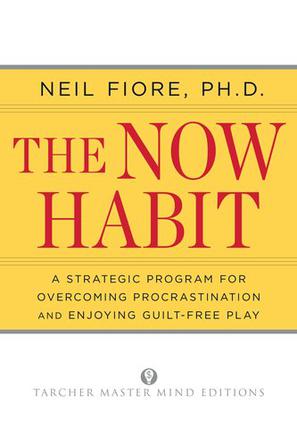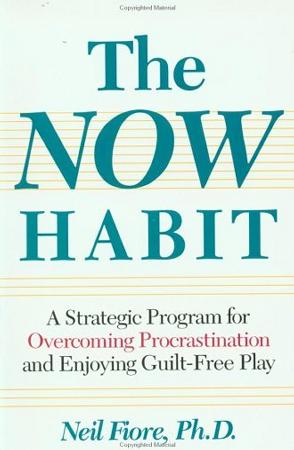-

Procrastination
The classic guide to understanding and controlling one of the most common and frustrating behavioral problems. Based on years of counseling, psychologists Jane B. Burka and Lenora M. Yuen offer a probing, sensitive, and sometimes humorous look at the problem that troubles everyone. Revealing the reasons we put off tasks-fears of failure, success, control, separation, and attachment-the authors outline a practical, tested program to overcome procrastination. Candid and understanding, Procrastination is a must-have today for anyone who puts everything off until tomorrow. -

Art of Procrastination
This is not a book for Bill Gates. Or Hillary Clinton, or Steven Spielberg. Clearly they have no trouble getting stuff done. For the great majority of us, though, what a comfort to discover that we’re not wastrels and slackers, but doers . . . in our own way. It may sound counterintuitive, but according to philosopher John Perry, you can accomplish a lot by putting things off. He calls it “structured procrastination”: In 1995, while not working on some project I should have been working on, I began to feel rotten about myself. But then I noticed something. On the whole, I had a reputation as a person who got a lot done and made a reasonable contribution. . . . A paradox. Rather than getting to work on my important projects, I began to think about this conundrum. I realized that I was what I call a structured procrastinator: a person who gets a lot done by not doing other things. Celebrating a nearly universal character flaw, The Art of Procrastination is a wise, charming, compulsively readable book—really, a tongue-in-cheek argument of ideas. Perry offers ingenious strategies, like the defensive to-do list (“1. Learn Chinese . . .”) and task triage. He discusses the double-edged relationship between the computer and procrastination—on the one hand, it allows the procrastinator to fire off a letter or paper at the last possible minute; on the other, it’s a dangerous time suck (Perry counters this by never surfing until he’s already hungry for lunch). Or what may be procrastination’s greatest gift: the chance to accomplish surprising, wonderful things by not sticking to a rigid schedule. For example, Perry wrote this book by avoiding the work he was supposed to be doing—grading papers and evaluating dissertation ideas. How lucky for us. -

Art of Procrastination
This is not a book for Bill Gates. Or Hillary Clinton, or Steven Spielberg. Clearly they have no trouble getting stuff done. For the great majority of us, though, what a comfort to discover that we’re not wastrels and slackers, but doers . . . in our own way. It may sound counterintuitive, but according to philosopher John Perry, you can accomplish a lot by putting things off. He calls it “structured procrastination”: In 1995, while not working on some project I should have been working on, I began to feel rotten about myself. But then I noticed something. On the whole, I had a reputation as a person who got a lot done and made a reasonable contribution. . . . A paradox. Rather than getting to work on my important projects, I began to think about this conundrum. I realized that I was what I call a structured procrastinator: a person who gets a lot done by not doing other things. Celebrating a nearly universal character flaw, The Art of Procrastination is a wise, charming, compulsively readable book—really, a tongue-in-cheek argument of ideas. Perry offers ingenious strategies, like the defensive to-do list (“1. Learn Chinese . . .”) and task triage. He discusses the double-edged relationship between the computer and procrastination—on the one hand, it allows the procrastinator to fire off a letter or paper at the last possible minute; on the other, it’s a dangerous time suck (Perry counters this by never surfing until he’s already hungry for lunch). Or what may be procrastination’s greatest gift: the chance to accomplish surprising, wonderful things by not sticking to a rigid schedule. For example, Perry wrote this book by avoiding the work he was supposed to be doing—grading papers and evaluating dissertation ideas. How lucky for us. -

The Art of Procrastination
This is not a book for Bill Gates. Or Hillary Clinton, or Steven Spielberg. Clearly they have no trouble getting stuff done. For the great majority of us, though, what a comfort to discover that we’re not wastrels and slackers, but doers . . . in our own way. It may sound counterintuitive, but according to philosopher John Perry, you can accomplish a lot by putting things off. He calls it “structured procrastination”: In 1995, while not working on some project I should have been working on, I began to feel rotten about myself. But then I noticed something. On the whole, I had a reputation as a person who got a lot done and made a reasonable contribution. . . . A paradox. Rather than getting to work on my important projects, I began to think about this conundrum. I realized that I was what I call a structured procrastinator: a person who gets a lot done by not doing other things. Celebrating a nearly universal character flaw, The Art of Procrastination is a wise, charming, compulsively readable book—really, a tongue-in-cheek argument of ideas. Perry offers ingenious strategies, like the defensive to-do list (“1. Learn Chinese . . .”) and task triage. He discusses the double-edged relationship between the computer and procrastination—on the one hand, it allows the procrastinator to fire off a letter or paper at the last possible minute; on the other, it’s a dangerous time suck (Perry counters this by never surfing until he’s already hungry for lunch). Or what may be procrastination’s greatest gift: the chance to accomplish surprising, wonderful things by not sticking to a rigid schedule. For example, Perry wrote this book by avoiding the work he was supposed to be doing—grading papers and evaluating dissertation ideas. How lucky for us. -

The Now Habit
A unique, comprehensive program designed to overcome the causes of procrastination. Dr. Fiore's powerful techniques will help the reader get work done and enjoy free time. -

The Now Habit